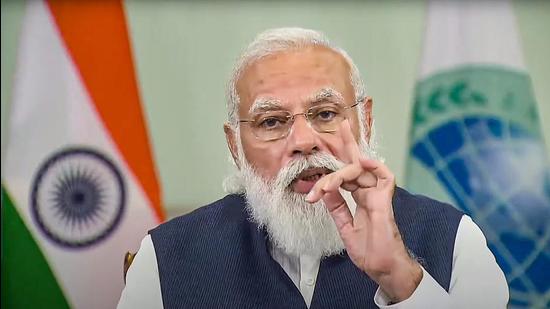Need joint approach to fight radicalisation, extremism: PM Modi at SCO Summit
Recent developments in Afghanistan have highlighted the challenges faced by the region, including the impact of growing radicalisation on peace and security, Prime Minister Narendra Modi said in his virtual address to the Shanghai Cooperation Organisation (SCO) Summit in Dushanbe
Recent developments in Afghanistan have highlighted the challenges faced by the region, including the impact of growing radicalisation on peace and security, Prime Minister Narendra Modi said on Friday against the backdrop of the Taliban takeover in Kabul.

In his virtual address to the Shanghai Cooperation Organisation (SCO) Summit in Dushanbe, Modi said the eight-member grouping should develop a joint approach to fight radicalisation and extremism. He also called for developing a network between moderate, tolerant and inclusive Islamic institutions in the SCO states.
The 20th anniversary of SCO is a suitable occasion to think about its future. I believe the biggest challenges in this region are related to peace, security and trust deficit and the root cause of these problems is increasing radicalisation,” Modi said, speaking in Hindi.
“Recent developments in Afghanistan have made this challenge more apparent. The SCO should take an initiative on this issue,” he said.
Also Read | India shares challenges that prompted us to join AUKUS: Australian envoy
India has watched warily since the Taliban took over Afghanistan on August 15 following the collapse of the Ashraf Ghani government. The establishment of a hardline governing setup by the Taliban that includes several key members of the Haqqani Network and the presence in Afghanistan of thousands of fighters from Pakistan-based groups such as Lashkar-e-Taiba (LeT) and Jaish-e-Mohammed (JeM) are among India’s main security concerns.
Along with its partners, India has called for the creation of an inclusive government in Afghanistan that protects the rights of women and minorities. India has also said that Afghan soil must not be used to carry out terror attacks against other countries.
Modi said in his address that Central Asia’s historic role as a “bastion of moderate and progressive cultures and values” should help inspire the fight against extremism. Traditions such as Sufism flourished in the area over the centuries and spread across the region and the world, he pointed out.
“We can still see their influence in the cultural heritage of this region. On the basis of this historical heritage of Central Asia, SCO should develop a common template to fight radicalisation and extremism,” he said.
“In India, and in almost all SCO countries, there are moderate, tolerant and inclusive institutions and traditions associated with Islam. SCO should work to develop a strong network between them,” he added.
Modi appreciated the work being done by SCO’s Regional Anti-Terrorist Structure (RATS), and called on members of the grouping to actively participate in activities being organised during India’s presidency of RATS.
The prime minister welcomed Iran as a new member state of SCO, and Saudi Arabia, Egypt and Qatar as new dialogue partners, saying the expansion reflects the grouping’s growing influence.
The current members of SCO are China, Kazakhstan, Kyrgyzstan, Russia, Tajikistan, Uzbekistan, India and Pakistan. Afghanistan, Belarus and Mongolia have observer status with SCO, while dialogue partners include Armenia, Azerbaijan, Cambodia, Nepal, Sri Lanka and Turkey.
Modi said fighting radicalisation is also necessary for the future of the younger generations, who have to be encouraged towards science and rational thinking in order to make the region a key player in emerging technologies. “We can promote this kind of thinking and innovative spirit by connecting our young entrepreneurs and start-ups,” he said.
The economic potential of the region has remained untapped due to radicalisation and insecurity, and SCO has to emphasise “mutual connectivity”, Modi said. India is committed to increasing connectivity with the landlocked Central Asian countries, which can benefit by accessing India’s vast market, he added.
“Unfortunately, many connectivity options are not open to them today due to lack of mutual trust. Our investment in Iran’s Chabahar port and our efforts towards the International North-South Corridor are driven by this reality,” Modi said.
Connectivity initiatives “cannot be a one-way street”, and such projects should be “consultative, transparent and participatory to ensure mutual trust”. Respect for territorial integrity of all countries “should be implicit”, and SCO should develop norms for connectivity projects based on these principles, he said.
Get Current Updates on India News, Lok Sabha Election 2024 live, Infosys Q4 Results Live, Elections 2024, Election 2024 Date along with Latest News and Top Headlines from India and around the world.



